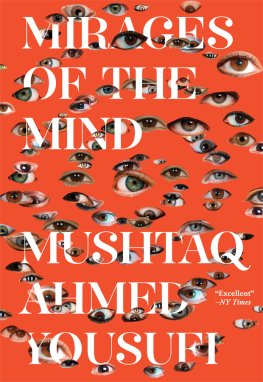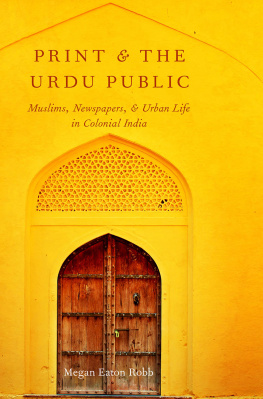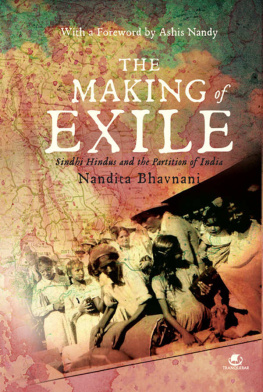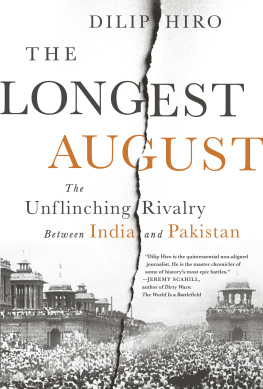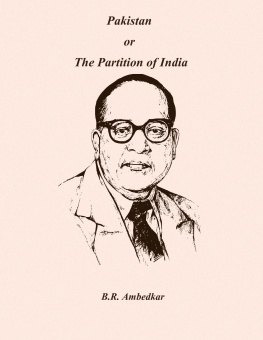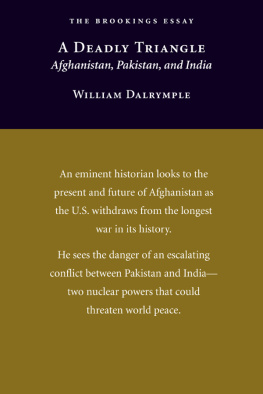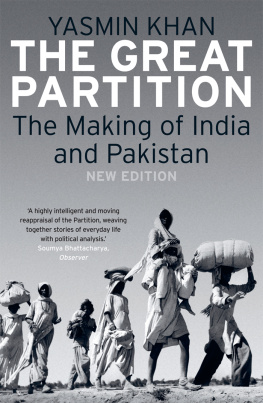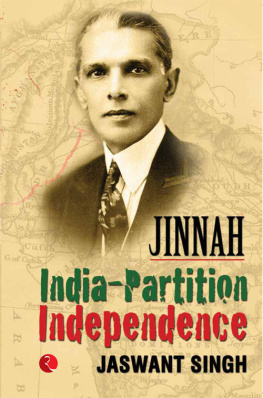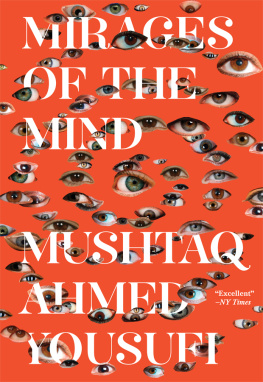Mushtaq Ahmed Yousufi
Mirages of the Mind
For Ashaa, Shoaa, and Sae Ah
Introduction.Mushtaq Ahmed Yousufi, a Biographical Sketch
Mushtaq Ahmed Yousufi was born in Tonk, sixty miles south of Jaipur, in what was then the British Indian state of Rajputana, and that is now Rajasthan. The year was 1922. His father was a local politician, and, in Yousufis own words, a simple, God-fearing Muslim. Yousufi was educated in Jaipur before receiving a law degree and an MA in Philosophy from the renowned Aligarh Muslim University. He married Idris Fatima in 1946, and the couples four children live today in Pakistan, America, and England. After a brief stint in the Indian civil service, he left for Pakistan. He arrived in Karachi in January 1950, and, aside from an eleven-year stint in London, he has lived there ever since.
Yousufi has won national awards for his contribution to Pakistani arts and letters, and critics and readers alike have praised his work, so much so that one critic has called contemporary Urdu humour and satire writing, the age of Yousufi. He has written four works, each of which has been extensively reprinted. Yet despite his national stature and the recognition that he ranks among the best humour and satire writers in the history of Urdu literature, not much is known about his life. That may be in part because he spent his professional life in banking: after his first job at Muslim Commercial Bank, he rose rapidly in the ranks, becoming President of United Bank in 1974 and the chairman of the Pakistan Banking Council in 1977. But the scarcity of biographical information may also be due to his personality and the fact that he shuns the limelight. In one of the few interviews he has granted, he readily admits to being a private person, and states that all he has to say is in his books.
Yousufi is known as a humour and satire writer, and the two together form one genre in Urdu literature. Humour and satire writing has been a vital part of Urdu literature since its prose traditions began to flower in the 1870s. It can be commonly found in newspapers and literary magazines, and it is often used to satirize society. Little is done to differentiate between the genres two aspects, and the resulting confusion has been perhaps the single-most important reason why the genre has not gained as much critical attention as short stories and classical poetry, the ghazal tradition. Yousufi, the leading contemporary practitioner of this hybrid craft, has stated that more care should be taken to separate the two, as there is a real difference namely, that of love, You cannot write humour until you love your target or subject of attack. Love is the foremost condition. In satire its not necessary. While there are moments of political and social satire in his writing, humour is the chief vehicle of Yousufis craft, and, love, in one form or another, its chief object.
Reading Guide
Mirages of the Mind (in Urdu, Aab-e-gum) is a challenging book. It is challenging because of its length but more so due to its erudition. Yousufi acknowledges the difficulty of his work. On the occasion of his being awarded the Sir Syed Ahmed Khan Lifetime Achievement Award in New York in 2008, he recited an anecdote about how a schoolboy admonished him for the difficulty of his Urdu. On a visit to the Karachi Grammar School, the boy asked him, Uncle, do you find it very difficult to write in simple Urdu? When Yousufi asked why, the boy said, Because so many of us have failed Urdu because of you!
Yousufis use of different rhetorical registers, his punning on Urdu poetry, and his encyclopedic descriptions of regional cultures mean that even the most astute Urdu reader will miss some of the subtle humour or will be unaware of certain cultural references. While we have tried to leave this experience intact as much as possible, English doesnt have as many rhetorical registers as Urdu does, and so it inevitably flattens some of the irony that comes when Yousufi writes in the decadent, florid, high Urdu of old. In light of its challenges, we would like to give several examples of the books main idiosyncrasies, namely, encyclopedic culture, poetry punning, narrative digressions, and cultural nostalgia.
ENCYCLOPEDIC CULTURE
The narratives of this book span the entire east-west axis of the northern Indian subcontinent, from the Khyber Pass to the floodplains of Bangladesh, and Yousufi documents regional culture each step of the way. He is fond of turning his attention toward subcultural traditions that are quickly becoming obsolete. This book is, as well as being The Adventures of Basharat Ali Farooqi, Bumbler and Bungler Extraordinaire, an encyclopedia of Pakistani and North Indian regional cultures in the twentieth century.
When Basharat goes back to Kanpur, his hometown, in his attempt to find the things that he has missed since immigrating to Pakistan, he meets a number of old men who, like him, want to know about their hometown, but, unlike him, havent had a chance to travel over the border. One such man is Ramesh Chander Advani. Basharat narrates his encounter, in which this man speaks longingly, and in great detail, about his native Baluchistan:
So, sir, I talked to Advani. Or not so much that as listened to his monologue. It was like being taken prisoner. He wanted to confirm that Jacobabad was as beautiful as it had been when he had left it as a young man. I mean, was the full moon as full as it had been? Do the palla fish still jump around in the Sindh Rivers waves, shining and glimmering in the sun? Is the weather still good? (Meaning, is it still 46 degrees in summer or has that declined as well?) Does the hot wind still blow from Khairpur with its sweet scent of dates? Was there still the yearly cattle fair in Sibi or not? What about the Sibi darbar? When I told him that at the fair there was now a poetry festival and poets came from great distances to participate, he went on for a long time lamenting the fairs deterioration.
This is only the first third of his monologue. Yousufi takes the time to fold such evocative, elegant sketches of regional, and increasingly historical, culture into the overarching narrative of Basharats adventures. Often he colours these descriptions with slight exaggeration to make them lightly humorous.
POETRY PUNNING
The reader will see that sections of the text are indented, and that some are in italics. All of these passages are lines of poetry: the ones that remain in Roman type are direct quotes from canonical English poems, given in the English original; and those that are in italics are Urdu, or occasionally Persian, poetry, that we have translated. The majority of these lines have been altered by Yousufi for humorous effects. In A Schoolteachers Dream, Basharat goes to confront Maulana Karamat Hussain, a worker for the Society for the Prevention of Cruelty to Animals, who has been giving him tickets for using an injured horse. He finds the mans shack in one of the poorest sections of Karachi. The man is absent, but his children, in a seemingly endless string, come out of the shack to greet Basharat. To this, Yousufi quips, The entire universe is one big net of children. This plays off a line of Ghalibs poetry:
Yousufi: alam tamam halqa-e-dam-e-ayal hai
Ghalib: alam tamam halqa-e-dam-e-khayal hai
The only difference is one syllable in the second to last word. Ghalibs couplet is full of metaphysical implications.
Dont be beguiled by being, O, Asad,
The world is but a single loop in thoughts net
Yousufi changes Ghalibs line into something entirely worldly and more practically challenging raising a bevy of kids on close to no income at all.
NARRATIVE DIGRESSIONS
Yousufis style is situated between the oral and the written, as it toggles between the recitation of anecdotes, third-person accounts, and intellectual asides. Yousufi himself functions as the narrator and scribe whom Basharat occasionally addresses in the course of telling his stories. This oral-textual style appears immediately in the first chapter, The Mansion: Long Live Qibla! When I first met him in 1945, he was as old as I am now. But since Im talking about my good friend Basharat Ali Farooqis father-in-law, it would be good to let Basharat say a few things. Ive heard the stories dozens of times. Now its time for you. Here, Yousufi writes in the first person. But he immediately passes the narrative task to a new storyteller. This back-and-forth between Yousufi and Basharat continues throughout the book, and it creates the story-within-a-story texture familiar from classic Eastern, or Oriental, tales.

